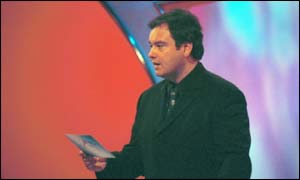Playing for Time
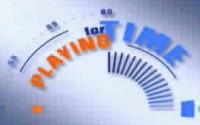
Contents |
Host
Paul Hendy (non-broadcast pilot)
Broadcast
BBC One, 13 November 2000 to 23 July 2001 (60 episodes in 2 series)
Synopsis
Eamonn Holmes, king of UK daytime telly, hosts this 12pm lunchtime offering from Auntie Beeb.
Okay, then, we've watched this a fair few times now and, although we despised it at first, it has grown on us a tiny little bit. However, we can't decide if it's (a) good but badly flawed or (b) just plain wrong but with some good bits. Why not take the time to read the following synopsis and decide for yourselves? Good.
Playing for Time pits two contestants together in a battle of speed and knowledge. The episodes are sequential so it's quite normal for one game to bleed into the beginning of the next episode, something we've not seen for quite some time.
Basic rules of the game then: Each player begins with sixty seconds on their clock (represented on the screens behind them). To begin, the host reads out a fact-based multiple choice question and the players' clocks begin ticking. The players who see the answers in front of them select one by hitting the relevant button. Their clock stops as soon as they hit the button.
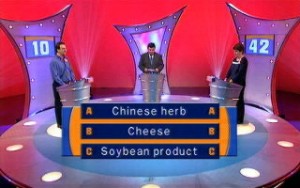 Tofu is a...?
Tofu is a...?If the player gets the question correct then that's all well and good. However, it's quite likely that they'll get a question wrong, in which case the player (or players) get a Timewaster question which is a brainteaser, often involving either numeracy, logic or a good vocabulary. They are generally a bit The Krypton Factor-ish, such as "If you went for lunch at 12:45 and came back at 1:18, how long did you have for lunch?" or "What is the third vowel in the word vocabulary?". It's stuff you would literally have to work it out, you couldn't just know them in advance. The idea of these punishments is to (believe it or not) waste the players' time and they'll keep getting these questions until they get one correct. This, of course, gives their opponent a big advantage.
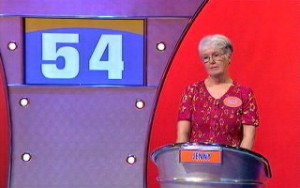 A contestant faces a Timewaster as her clock ticks away
A contestant faces a Timewaster as her clock ticks awayOf course, there's always a chance that both players will have got the multiple choice question wrong. In this case a timewasting question is thrown open on the buzzers and both clocks will be running. The first player to buzz in (both clocks stop when someone has buzzed) gets to answer. If they are correct then they are safe, but their opponent keeps getting timewasters on their own until they get one correct. However, if they buzz and get it wrong then the opponent is safe again and they've got to keep going until they get one right.
Aaaanyway, it's a lot less complicated than it sounds but that's the main gist of the game. The loser of each round is the person who's clock runs out first. This will mean that the winner will have time left on their clock. This gets deposited in their Bank for later (and we shall explain the significance of that later too).
Second round is played in the same way. Both clocks are reset to 60 and the game begins anew.
Now it's quite possible that someone would win two games in a row, in which case it's goodbye opponent. However if it gets to one-all then Extra Time is played. This is a speed general knowledge round played on a chess clock principle. Sixty seconds are on both clocks and the person who has least time in their bank will begin (it's a disadvantage certainly but they are the one who has performed comparatively worse). Their clock will start. As soon as they get a question right their clock stops and their opponent's starts. First one to run out of time loses and it's goodbye but thanks very much for coming on.
The winner then will now have time in their bank. They now have a big decision to make. They can face another opponent so they can add more time to their bank (but of course if they lose then it's Goodnight Vienna) or they can have a crack at the holiday, Playing for Time Away (quite cleverly). To help make that decision, the winner is given a quick introduction to the next player they could be facing.
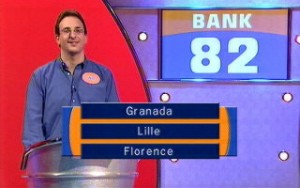 A contestant chooses his prize destination
A contestant chooses his prize destinationThe player is given a choice of three random European destinations. Once one has been picked the game begins: simply the player must answer five general knowledge questions correct in the amount of time they have in their bank. If they do it they win the holiday, but if not then they leave with nothing (the BBC's favourite word at the moment, it seems - c.f. Friends Like These, The Weakest Link et al).
That basically is Playing for Time. OK, so now we start the opinion bit.
Opinion mode: on. Right, where do we start? Colour schemes, that's where. That set, obviously determined to be the gaudiest set ever devised in game show history, has red, purples and oranges all over the shop. Mmm! Tasteful.
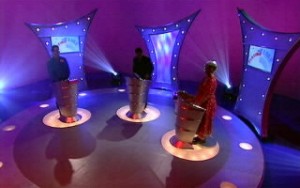 The Playing for Time set in its low-contrast setting
The Playing for Time set in its low-contrast settingThe clocks behind the players has each second printed on alternate bands of orange and purple (the next band slides in from above to replace the number that's showing). This would be all well and good but it looks to us as if the strips bend upwards. Surely they should be bending the other way, so as to represent better the losing of time? Picky, I know, but annoying nonetheless.
Also: never, ever, ever put dark blue writing on top of a slightly lighter shade of blue background, as some of the contestant info is. Whoever does the graphics for show should in fact be forced to watch the show for 24 hours just to see how bad that is.
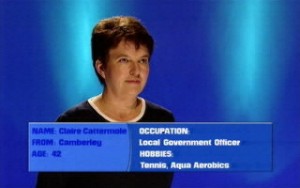 Can you read that text on the left? Neither can we.
Can you read that text on the left? Neither can we.Trivialities aside, there are somewhat more pressing problems. The real downer relates to the crux of the show - the clocks. These are all timed such that they operate to the nearest second, rounded down. This makes a mockery of the hitting the multiple choice button as fast as you can as potentially you could be almost a second slower than your opponent but, providing you've pressed it before the next second starts, then you've done no worse.
What is more, the commencing of clocks for each question seems to be subjective and random. We think they are supposed to start when Eamonn's finished reading the question out, but in practice they seem to start at some completely arbitrary point. Whilst this is the same for both players, in show where time is the main element it looks a bit sloppy.
Yes, using tenths of a second on the clocks may not be very BBC daytime friendly, but it wouldn't half of made the game more clear-cut (and possibly, more exciting, as it would make tenths of a second look like something worth having). Furthermore, the clocks seem to begin at the start of Eamonn reading out the Timewaster questions, meaning that some people are randomly punished more than others depending on what question they get. It would have been a lot better if they'd done all the questions so that the clocks counted down only during their thinking time. (Perhaps this makes the game longer, but this can be compensated for by giving the contestants 30 or 45 seconds instead of 60).
While the Timewaster questions are fun and interesting, the general knowledge ones in comparison are quite dull and unengaging. It's really just some 100% A-B-C questions in a different guise. We'd probably deliberately get questions wrong just to do a timewaster, truth be told.
The holiday end game could have been made a lot more interesting if there was more of an incentive to stay on. As it is, a jammy contestant with 40-odd seconds in the bank from their first game has a no-brainer decision to go for the 5 questions needed. Furthermore, even if a contestant doesn't quite have enough time on their first game, they have more than enough on their second that the decision is again trivial.
One of the ideas kicking around the editorial staff here was a system whereby the more questions you try for, the better the destination so if you wanted to go around the world you'd need to bid, say, 20 correct answers in the time in the bank. It would have been more interesting than the current set-up. At the moment, you don't really care if someone wins or not. A chance to get behind a player over more than one programme would be more fun.
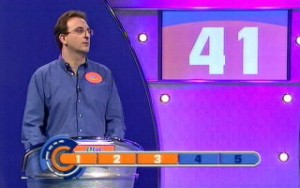 The holiday end-game in progress
The holiday end-game in progressFinally, Eamonn Holmes blatantly stalls in the holiday game so much if a contestant's got loads of time that it strikes us as being a tad unprofessional.
So, overall it's not amazing. It's still fairly nicely done, but at the end of the day it's just another in a long line of quizzes involving multiple choice questions against the clock. There isn't any hook or bite to make it stand out from the crowd, and the adjudication is so sloppy that it's in danger of making a mockery of the game itself. Then again, it's more strict than their scheduling rival - Midday Money on Richard and Judy. Not saying much though, is it?
Trivia
Not to be confused with Taro' Mlaen, an HTV childrens quiz revived in 1998 as "Playing for Time".

